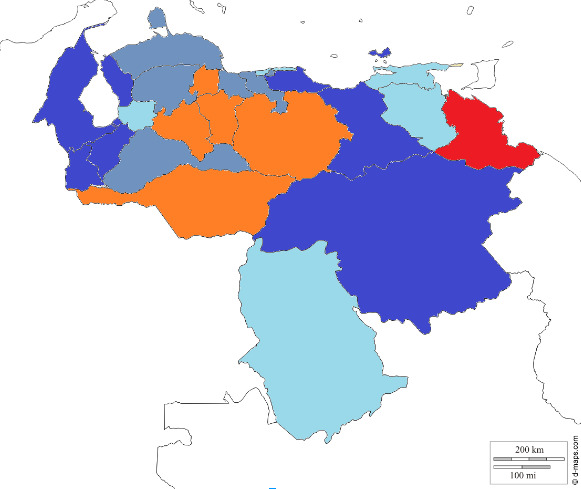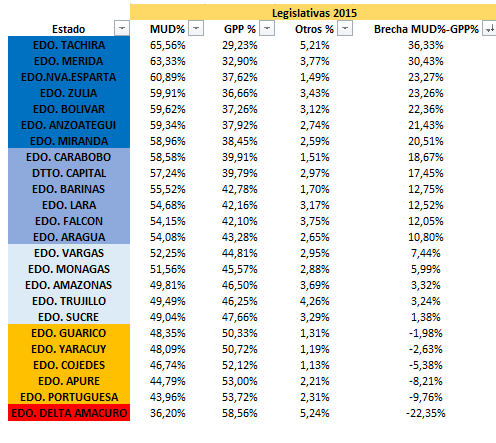Feelin' blue about our not-so-blue map
Yes, MUD did win in 17 of 24 states in last December’s Legislative Elections on 6D. But a good many of those wins were too close for comfort. We walk you through the wide-open map for upcoming gubernatorial elections.


One of the most fulfilling images seen late at night on December 6th, when the National Electoral Council (CNE) allowed the legislative election results to be known, was the Venezuelan map painted almost entirely blue instead of red for the first time in who knows how long.
The thing is, it was downright misleading.
The MUD won 17 out of 24 states, including all the predominantly urban states. Better yet, the MUD won the states where 89.8% of Venezuelans live. To give you a sense of how rural the PSUV’s base is now, consider that the most populous state they won is friggin’ Portuguesa, whose total electorate is still almost 120 thousand voters smaller than the city of Barquisimeto.
So that’s the good news, right? Well, not so fast.
When the map doesn’t reflect the closeness of many of those races, perception is replaced by illusion. Here’s a version of that map that shows the percentage gap in favor or against the New Majority’s parliamentary candidates.
The bluer the state, the more MUDdy it is. The redder, the more chavista. And also, here’s a chart with the numbers on every race, statewide.
Seven states are shoo-in victories for the MUD, being the only states where the gap was 20 percentage points or over in favor. The opposition’s coalition managed to win in ten additional states, but by margins that range from a relatively safe 18.7 advantage to a narrow 1.4 percentage points.
This is what that blue-red map we saw late December 6 leaves out: how different those 17 wins are from one another. Let’s zoom into the results to understand why even an almost 19 p.p. difference can be less substantial than it seems.
A 20 p.p. gap implies a win in the realm of 60% to 40%. That is what we can address as safe states. Anything ranging between 59%-41% and 51%-49% can be seen as more volatile or less safe, and therefore requires special attention.
In Táchira, we doubled chavismo (65.56% vs. 29.23%), being our best performer on the list, but in Miranda, the “tightest” race amongst these solid seven wins, the gap was almost 15 points shorter between both sides (58.96% to 38.45%). Notice how MUD’s percentage in Miranda is just 6.6 p.p. lower than Táchira’s, and yet the gap is that much tighter.
Along with the aforementioned seven strong performances, another three states -Lara, Carabobo and Barinas-, and the Capital District, saw at least a 55% of turnout favoring MUD, raising the tally of well-performing states to 10. That is more than a threefold increase for a faction currently holding the seat of only three out of 23 states (Alcaldía Metropolitana excluded).
But this is where things get tricky. Yes, the overwhelming majority of states don’t belong to the Gran Polo Patriotico, but the truth is that in the end, we approach state elections with an extra 12 states still being up for grabs -Delta Amacuro being practically unobtainable.
The remaining seven of MUD’s 6D victory spoils can be harder to convert into sitting governors. Those states are former bastions of chavismo, and that will always make things much harder for MUD.
We’re talking about places like Aragua, Falcón, Guárico, Sucre, Trujillo, Apure, Vargas, among others. Winning these states ought to be a priority for the New Majority in the same way chavismo is invested in retaining them, for reasons beyond electoral bickering and a foreseeable who’s-got-more-states-showdown between la Mesa and el Polo.
Aragua is a symbolic trench of chavismo just like Sucre, and the seat of military power. This makes it pivotal for chavismo.
Falcón has in the Paraguaná Peninsula the Amuay Refinery, one of the biggest in the world, a place that is also somewhat strategic. Guárico is where an alleged ally of drug movers, Rodríguez Chacín, holds office. Trujillo and Vargas’ governors were some of the best elected governors of all. And the cherry on top, Apure, is on perhaps the most permeable part of our border, where guerilla fighters seek sanctuary.
Regional relevance plays its part here as well, and governors from Trujillo, Sucre, Falcón and Vargas won’t go down without a proper fight. Losing those states alone would set MUD back to 13, four less than 6D. Four defeats, mind you, that aren’t at all farfetched.
The good news is that if the deplorable state of the country can sway voters towards MUD’s cause, it is possible to aim at winning 22 of all 23 states in the gubernatorial race; a crushing defeat to chavismo and a logistical nightmare, considering the impact that would have on their capacity of running their political operation in almost every part of the country.
The problem is that MUD doesn’t seem to be interested in discussing state elections just yet, instead focusing more on the recall referendum and legislative agenda.
The other bad news is that expectations among MUD supporters are now too high: 2 million signatures in three days AND a blowout last December later, it’s hard to talk sense into people without them feeling somewhat shaken about the idea of giving up even one of the recent wins.
Anything under 17 separate victories can be interpreted as chavismo gaining back some ground, when in fact it really isn’t the case. It’d be a shame to see momentum shift without real reason, all because of a damn blue-red map.
The numbers simply aren’t as solid as we would have hoped, and yes, the hype is also partly to blame. Had we been more honest about that blue map, we wouldn’t have sold the gap as that hard to close for chavismo, when, in fact, it always was.
Don’t get me wrong: 6D was as amazing as wins can be, but it wasn’t definitive. It wasn’t Germany’s 7 to Brazil’s 1 in the 2014 World Cup. It was chavismo being knocked to the ground but making it back up on its feet before the 10 count finished.
This is nothing a couple of jabs can’t fix, but we need our boxer to be willing to go for the KO. We are notoriously lacking this right now.
Caracas Chronicles is 100% reader-supported.
We’ve been able to hang on for 22 years in one of the craziest media landscapes in the world. We’ve seen different media outlets in Venezuela (and abroad) closing shop, something we’re looking to avoid at all costs. Your collaboration goes a long way in helping us weather the storm.
Donate






